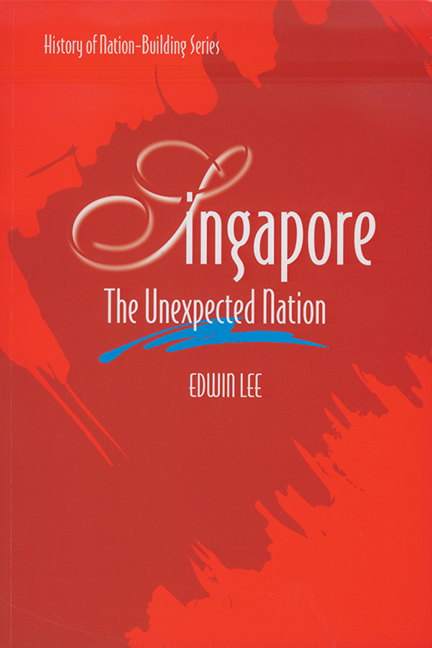Book contents
- Frontmatter
- Dedication
- Contents
- Preface
- Introduction by Wang Gungwu
- Chapter One Beginnings: From Temasek to Singapore
- Chapter Two Race, History and Nationalism
- Chapter Three Contestants and Contesting Visions
- Chapter Four The Accidental Chief Minister
- Chapter Five The Terminal Chief Minister
- Chapter Six The Embattled Prime Minister
- Chapter Seven Merger: Contesting Ownership and Principles
- Chapter Eight Terms of Disendearment
- Chapter Nine Dare to be Equal
- Chapter Ten The Way to Survive
- Chapter Eleven National Service: The Price of Independence
- Chapter Twelve Politics of Education
- Chapter Thirteen Home Ownership, National Stability and the New Middle Classes
- Chapter Fourteen University and Nation
- Chapter Fifteen Toh's Nation-Building Thrust
- Chapter Sixteen Nantah: Between Community and Nation
- Chapter Seventeen Self-Renewal: Talents for a Tough Act
- Chapter Eighteen The Consensual Prime Minister
- Chapter Nineteen Confucianism, Christianity, Chineseness
- Chapter Twenty Singapore Dreams, Singapore Dilemmas
- Chapter Twenty-One The Hyphenated Singaporean
- Chapter Twenty-Two The Unexpected Nation
- Bibliographical Note
- Index
- The Author
Chapter Sixteen - Nantah: Between Community and Nation
Published online by Cambridge University Press: 21 October 2015
- Frontmatter
- Dedication
- Contents
- Preface
- Introduction by Wang Gungwu
- Chapter One Beginnings: From Temasek to Singapore
- Chapter Two Race, History and Nationalism
- Chapter Three Contestants and Contesting Visions
- Chapter Four The Accidental Chief Minister
- Chapter Five The Terminal Chief Minister
- Chapter Six The Embattled Prime Minister
- Chapter Seven Merger: Contesting Ownership and Principles
- Chapter Eight Terms of Disendearment
- Chapter Nine Dare to be Equal
- Chapter Ten The Way to Survive
- Chapter Eleven National Service: The Price of Independence
- Chapter Twelve Politics of Education
- Chapter Thirteen Home Ownership, National Stability and the New Middle Classes
- Chapter Fourteen University and Nation
- Chapter Fifteen Toh's Nation-Building Thrust
- Chapter Sixteen Nantah: Between Community and Nation
- Chapter Seventeen Self-Renewal: Talents for a Tough Act
- Chapter Eighteen The Consensual Prime Minister
- Chapter Nineteen Confucianism, Christianity, Chineseness
- Chapter Twenty Singapore Dreams, Singapore Dilemmas
- Chapter Twenty-One The Hyphenated Singaporean
- Chapter Twenty-Two The Unexpected Nation
- Bibliographical Note
- Index
- The Author
Summary
Nanyang University (or Nantah, to use the short form) was founded at a time when British colonial rule was passing, and a new nation was in the making in Malaya. Chinese clan and chamber of commerce leaders recognized this as a crucial time to claim for the Chinese community an equal place with other ethnic communities in the nation-to-be. They believed that the finest expression of this ideal was the freedom as a community to preserve their language, education, and culture, equally with other communities which would do the same. With Nantah's founding, the stakes in Chinese language, education, and culture were raised to a whole new level. The timing of Nantah's advent was not only critical because of imminent political change in Malaya, but also because the People's Republic of China had become a closed door to Malayan Chinese seeking tertiary education in Chinese. Singapore was where the idea of Nantah originated and was established in reality, but the community effort to establish it that Singapore Chinese tycoons spearheaded was supported by the Chinese in Malaya as well.
The promise of Nantah was never to be fulfilled. British officials and Malay nationalists alike looked on Nantah, and indeed, the whole Chinese education structure, as an obstacle to national integration. The British would have nothing to do with Nantah, denying it recognition and financial support. However, Singapore's elected political leaders had to deal with the Nantah problem. Chief Minister Lim Yew Hock, as we shall see, and some others too, tried to squeeze some electoral mileage from it. When negotiating the merger with Malaya, the PAP had to ask for education to be made a state as opposed to federal responsibility, clearly with Nantah in mind.
The great irony is that Nantah failed to survive in post-1965 Singapore under a PAP Government committed to giving every ethnic community an equal place, according to its tenet of multiracialism and multilingualism. One reason, and a compound one at that, is Nantah's involvement with the communist united front, supporting and being supported in return by the Barisan Socialis and the SATU unions; and Nantah's resistance to reform and the history of disturbances associated with this. Thus Nantah appeared as a threat to the English-educated ruling elite, the PAP Government, and its control over nation-building.
- Type
- Chapter
- Information
- SingaporeThe Unexpected Nation, pp. 417 - 452Publisher: ISEAS–Yusof Ishak InstitutePrint publication year: 2008

